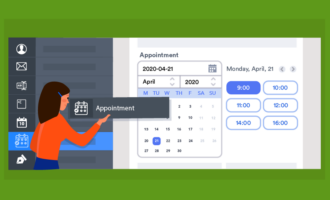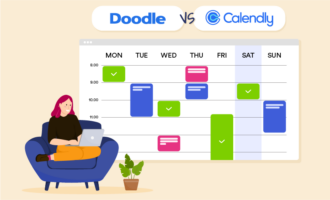Top time management apps
Time management apps and tools seem to be all the rage these days and for good reason.
Considering the sheer amount of work that pops up on any given day, the ability to create projects, assign tasks to specific employees, and track everyone’s progress in a single platform has been a godsend for business teams everywhere.
But with so many time management apps out there, how do you decide which one is right for you and your team? Jotform’s founder and CEO, Aytekin Tank, has chimed in on the issue with productivity apps.
We’ve tested our fair share of time management apps at Jotform and found a few that are not only effective but also free, albeit with some limitations.
While there is no one-size-fits-all approach to time management — different teams will naturally have different needs — here are some of the time management apps and tools we’ve found helpful and the features that make them stand out.
1. Todoist
Cost: Free plan available, $4/month for Premium features and $6/month per user for Business features
Some people swear by checklists, especially when they need to organize their thoughts and keep track of shifting priorities.
Todoist streamlines this process. You can add a task by typing it in or saying it aloud — before you forget about it — regardless of where you are, what device you use, and whether you have an internet connection.
You can also add deadlines and set recurring ones once you enter your task into the app. Todoist even makes it easy to stay organized by allowing you to create project sections and subtasks. Stay on top of things by including color-coded priority flags to underscore a task’s importance or add labels for notes and follow-up reminders.
Collaborate by assigning tasks to people, and take stock of your overall progress by reviewing your completed tasks and goals over time.
2. RescueTime
Cost: Starts from $6.50 per month
We’re all guilty of spending too much time on certain activities at work, whether it’s answering emails, watching cat videos during breaks, or checking social media notifications that pop up.
Time management apps can reduce distractions that eat into your valuable time, inhibit your productivity, and cause you to fall behind.
That’s where RescueTime can help.
The app monitors which applications and websites you visit, as well as how long you spend on each one. It runs discreetly as you go about your day — so you won’t be bothered — and compiles a weekly email report that summarizes your online activity.
With RescueTime’s free version, you can track your productivity progress by viewing up to three months of reports.
You can also set time management goals to improve your efficiency and set reminders that help you stay on track. For instance, you can create an alarm when you spend more than three hours on social media or video-sharing sites, such as Facebook and YouTube.
RescueTime also works across devices — desktop, laptop, or mobile — and operating systems — Mac, PC, Linux, Android, and iOS.
3. Evernote
Cost: Free plan available, $10.83/month for Personal, $14.17/month per user for Professional and $20.83/month per user for Teams
Evernote offers a comprehensive suite of services that allows you to take notes, edit them, and organize them with the use of notebooks, tags, and stacks. The app also works across devices so you can find, organize, and take notes on your time.
You can even include a number of different files with your notes, such as hand-drawn sketches, PDFs, photos, audio recordings, and voice memos. If you’re on the go, you can use voice commands through Google or Siri to create, update, or look up notes.
The Evernote browser extension also allows you to archive anything on the internet, such as articles, web pages, images, or PDF files, and sort it all into notebooks and with tags.
If you have a time-sensitive task coming up, you can stay on track with the help of checkboxes, day-timed reminders, and email notifications. It’s even possible to encrypt text in a note to protect sensitive information, such as account numbers.
The good news is that anything in Evernote, such as meeting handouts or slide decks, can be shared with anyone, regardless of whether or not they have an Evernote account.
4. Ayoa
Cost: Free plan available, premium features starts from $10/month
Since it caters specifically to visual learners, Ayoa (formerly known as DropTask) offers a new take on task management software. Canvas view, one of several layout options, is a perfect example.
The free version of Ayoa limits you to two projects, with two members allowed for each one, but allows you to create an unlimited number of tasks and groups.
There are some familiar features, such as setting due dates, assigning individual tasks to specific people, filtering task searches, and using tags to group certain types of tasks together. Ayoa users have the option to use a Kanban-style layout for their workflow boards and to track a task’s progress by percentage complete.
Ayoa, however, has some unique features that offer an uplifting approach to managing and completing work.
For example, you can choose to receive notifications, known as “Achievements,” that deliver praise when you reach key productivity milestones while going about your day. When you complete a task, your coworkers or managers can send some love your way, too.
Ayoa also allows you to place tasks in a “Now,” “Next,” or “Soon” schedule category and will send you a notification when important changes arise in your workflow or within a project. You can even change the status of a project or underscore its priority by marking it with a red flag.
Since communication is key in any project, Ayoa merges tasks with chat features so you can collect feedback quickly and seamlessly.
5. Pocket
Cost: Free plan available, $4.99/month for Monthly Membership, $44.99/year for Annual Membership
Ever found something really cool on the internet, such as an article, a published study, or a podcast, that you wanted bookmark and reference later?
That’s exactly what Pocket does.
At a fundamental level, the app serves as a repository for online content, such as articles and videos, gleaned from any publication, web page, or app. You can even listen to or read the saved content offline, so there’s no need to worry about having a solid internet connection.
You can save information to Pocket by sending an email to a specific address, using a Pocket bookmarklet, or taking advantage the app’s integrations with more than 1,500 apps.
Pocket can be used on many popular mobile devices, web browsers, and operating systems, including iPad, iPhone, Android, Mac, Kindle Fire, Kobo, Chrome, Safari, Firefox, Opera, and Windows.
Want to continue learning more about time management? We’ve rounded up some of the top books and podcasts about the subject. Jotform’s guide on time management strategies is another useful resource.
What is your favorite productivity tool, and how has it helped you make the most of your time? We’d love to hear from you in the comments below!































































































Send Comment:
2 Comments:
More than a year ago
The post that you have shared is quite informative. I personally use a time tracking app to stay organized and productive round the clock. Here, if you are looking for any tool to manage your time better, try best time tracking app .Super easy to use and really cost-effective as well.
More than a year ago
Hi Darin,
Ans: Thanks for sharing the information about time management apps. I am using the Orangescrum free time management apps to managing time of our team. It is very smart tool and easy handle by all team members.